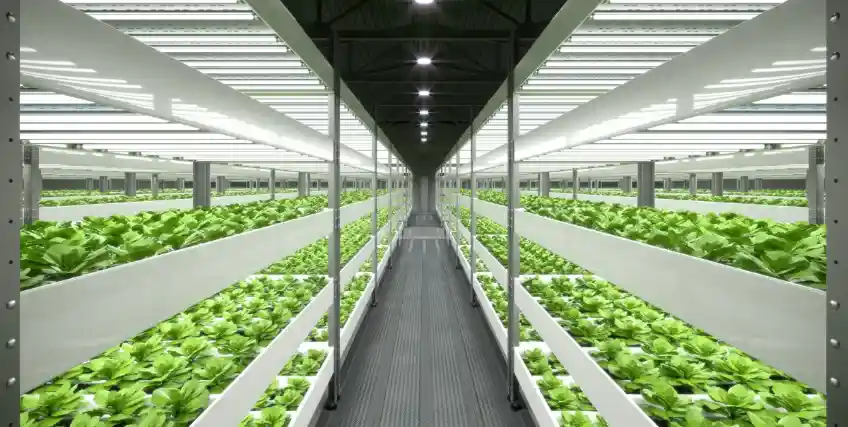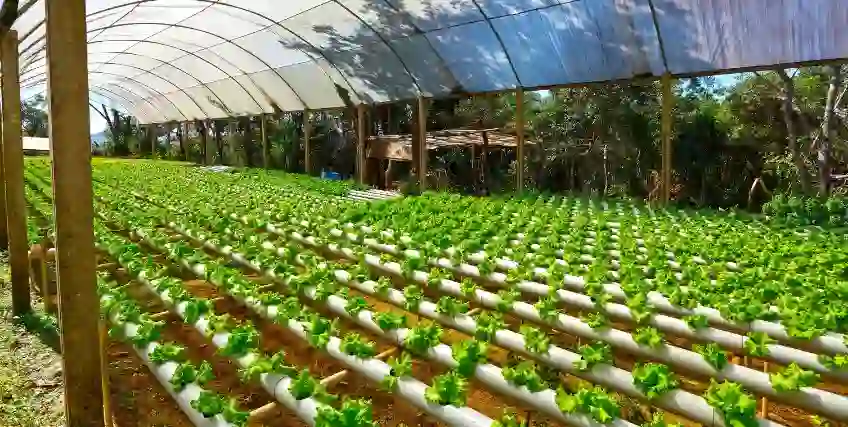Hydroponic Farm Business Loans: The Complete Funding Options Guide
Oct 07, 2025 | Last Updated on: Oct 08, 2025

Hydroponic farming is revolutionizing the way food is grown, enabling year-round production without the need for soil. It’s efficient, sustainable, and increasingly popular with entrepreneurs. But starting or expanding a hydroponic farm requires a large investment in equipment, technology, and infrastructure. Most small business owners can’t cover these costs out of pocket, so securing outside funding through loans or equity investment is essential. This article explores loan options for hydroponic farm businesses, common ways the money is used, and how growers can prepare their finances before applying.
Why Hydroponic Farms May Need Funding
Hydroponic farms are more than just plants growing in water. They require advanced systems that mimic and optimize natural growing conditions in a controlled environment. For many small business owners, these indoor farming expenses create a steep barrier to entry. Here are the main costs that funding can help cover:
- Equipment. LED grow lights, water pumps for vertical farming, nutrient delivery systems, and climate control equipment.
- Technology. Automation tools, monitoring systems, and farm management software.
- Infrastructure. Greenhouses, vertical racks, or indoor facilities that house the farm.
- Working Capital. Covering payroll, energy costs, nutrients, packaging, and ongoing utilities.
- Expansion Costs. Scaling to larger facilities, adding new grow systems, or diversifying crops.
Without outside financing, it’s nearly impossible for most entrepreneurs to launch a hydroponic farm or expand the square feet of an existing one.
Loan Options for Hydroponic Farm Businesses
There are many indoor hydroponic farming loan options that cater to the needs of your business. Whether you're growing leafy greens, ripe tomatoes, or other types of fresh produce, hydroponics can often produce higher yields per square foot than conventional farming methods while using less water, especially when you implement large scale, high-tech farming techniques. Explore these farming funding opportunities that can provide the money you need to buy or expand your hydroponic farm business.
SBA Loans
The U.S. Small Business Administration (SBA) is one of the most popular sources of financing for
small business owners, including those in agriculture and hydroponics. While the SBA doesn’t
lend money directly, it works with banks, credit unions, and other approved lenders by
guaranteeing a portion of the loan.
For hydroponic farm businesses, SBA loans can be
especially helpful because they typically offer lower interest rates, longer repayment terms,
and more flexible use of funds to qualified candidates.
There are several SBA loan programs that may work well for hydroponic farm entrepreneurs:
- SBA 7(a) Loan. The (7a) loan program is the most flexible SBA loan option. Loan proceeds can be used for working capital, equipment, and even real estate. You can borrow up to $5 million with repayment terms as long as 25 years (for real estate).
- SBA Microloan. This loan program offers startups and small business owners up to $50,000. It is ideal for small hydroponic farms just starting out or when you don't need to borrow a lot of money. The funds can be used for supplies, equipment, or operating expenses.
- SBA CDC/504 Loan. SBA 504 loans are designed for major fixed assets, like land, facilities, or large equipment purchases. These loans offer long repayment terms at competitive rates.
The main drawback to SBA loans is that the application process can be lengthy, and it often requires detailed documentation. Borrowers may need to provide secondary collateral, like the equity in their home or a blanket lien against business assets. However, for business owners who qualify, SBA loans are among the most cost-effective ways to fund the launch or expansion of a hydroponic farm.
Agricultural Loans
Because hydroponic farming is part of the agricultural sector, many small business owners may qualify for specialized farm loans. These programs are designed to support food production, whether it’s traditional soil-based farming or modern methods like hydroponics.
USDA Farm Service Agency (FSA) Loans
One of the most common options is through the USDA Farm Service Agency (FSA). The FSA provides loans to help farmers purchase land, cover operating expenses, or invest in equipment. These loans are especially valuable for beginning farmers or those who may not qualify for traditional bank financing for these sophisticated farming systems. Some USDA programs even offer reduced down payments or lower interest rates, making them a practical choice for hydroponic farm businesses that need affordable startup or expansion capital.
Farm Credit Institutions
Another option comes from Farm Credit Institutions, which are cooperative lenders dedicated to agriculture. These institutions provide financing for land purchases, infrastructure development, equipment, and operational needs. Because they specialize in agriculture, Farm Credit lenders often have a better understanding of the unique challenges and opportunities facing hydroponic farms compared to traditional banks.
Other Agricultural Loan Programs
Other agricultural loan programs may be offered at the state or local level where your business operates. Many states have non-profit and government-run agricultural development initiatives aimed at promoting sustainable farming practices, including farm purchase grants that can lower the cost of starting out or expansion. Some local credit unions may offer farm-focused financing. For hydroponic farm businesses, these programs can be an excellent way to secure funds while also aligning with sustainability goals that may make them eligible for additional incentives or grants.
Alternative Financing Options for Hydroponic Farm Businesses
Not every small business owner has perfect credit or the time to wait through lengthy loan processes. Alternative financing offers faster and more flexible options than conventional loans.
- Online Business Loans. Often available to startups and businesses with limited credit history.
- Business Lines of Credit. Works like a credit card but with higher limits. You only pay interest on what you draw. Great for managing cash flow.
- Equipment Financing. Allows you to spread the cost of hydroponic systems over time while using them to generate revenue that you can use to repay the loan. The equipment itself serves as collateral.
- Invoice Financing. If your business sells produce to retailers or restaurants, you can borrow against unpaid invoices for short-term cash flow.
- Merchant Cash Advance (MCA). Farmers who accept credit cards from customers or the general public for their goods may qualify for a merchant cash advance. You'll receive a lump sum of cash upfront, with the loan repaid over time as you collect payments from customers.
Pros and Cons of Using Alternative Financing Options
While alternative financing options can be an option for your hydroponic farm business, you need to analyze the pros and cons before submitting an application.
Pros:
- Faster funding decisions.
- More lenient credit requirements.
- Useful for small or new hydroponic farm businesses.
Cons:
- Higher interest rates and fees.
- Shorter repayment terms.
Alternative financing is often a good bridge for entrepreneurs who need quick access to funds but may pursue longer-term options later.
How These Loans Support Hydroponic Farms
No matter the type of financing, loans can make hydroponic farming more accessible. Here’s how they can help:
- Cover Setup Costs. Building a facility, installing grow lights, and buying nutrient delivery systems can cost tens of thousands of dollars. Loans spread those costs over time.
- Provide Working Capital. Even after setup, farms need a steady cash flow to cover payroll, utilities, and supplies. Loans ensure operations don’t stall.
- Fund Scaling Operations. Expanding to new facilities, adding more grow systems, or automating with new technology requires additional capital. Loans make growth achievable.
By securing financing, entrepreneurs can focus on producing high-quality crops and expanding their customer base, rather than worrying about cash shortfalls.
How to Prepare Your Finances Before Applying
Securing financing for a hydroponic farm business takes preparation. Lenders want to see that you’re serious, organized, and financially responsible. Here’s how to position yourself to improve your approval odds:
Review Your Credit Score
Your personal and business credit scores play a major role in loan approval. Check your scores early to see where you stand. You can access your credit report for free from each of the three major credit bureaus at AnnualCreditReport.com. Many banks provide customers free credit scores through their mobile apps or online banking.
Take Steps to Boost Credit
Improving your credit score can help you qualify for better rates and terms on your loan. If your score is low, take action to increase your credit score can mean the difference between approval and decline on your application. Take these steps to boost your credit score before applying:
- Pay down outstanding debts. Reducing credit utilization is the quickest way to improve your credit score. Paying off debt or reducing your balances can also lower your debt-to-income (DTI) ratio and debt service, making it easier to get approved.
- Avoid late payments. Your payment history is the single biggest factor in determining your score.
- Correct any errors on your credit report. Approximately one-in-four consumers have errors on their credit report significant enough to impact their score.
- Keep credit utilization low. Ideally, you should keep the balance on each of your credit cards below 30% of your credit limit. Paying down your balance or requesting a credit limit increase can improve your utilization ratio.
Write a Strong Business Plan
A detailed business plan highlighting the strengths of your business, your industry experience, and how the money will be used can provide critical information necessary to approve your loan request, especially for hydroponic farm businesses. Your business plan should include:
- Market research showing demand for your crops.
- Detailed financial projections showing prices, expenses, and profitability.
- How you’ll use the loan funds for upgrades to increase profit margins.
- A clear explanation of your business model.
- SWOT analysis showing how your business compares to competitors.
A well-prepared application improves your chances of getting approved and may help you qualify for better terms.
The Bottom Line
Starting or growing a hydroponic farm business requires significant investment, but financing options make it possible. SBA loans provide affordable, government-backed support. Agricultural loans cater specifically to farming needs, while alternative financing offers quick access to capital for newer or smaller businesses. With the right preparation, you can increase your chances of securing the funding needed to bring your hydroponic farm to life.
Frequently Asked Questions (FAQs) About Hydroponic Farm Businesses
How much does it cost to start a hydroponic farm business?
Startup costs vary depending on size and setup. Costs include grow lights, pumps, nutrient systems, and infrastructure.
Can I get an SBA loan for a hydroponic farm business?
SBA loans, such as the 7(a), Microloan, and CDC/504 programs, can fund hydroponic farm businesses. Depending on which SBA loan you apply for, the proceeds can be used to purchase equipment, cover working capital, or buy real estate.
What type of equipment can a loan cover for a hydroponic farm business?
Equipment loans can be used to cover a variety of hydroponic farm business equipment needs. Examples of these items include grow lights, pumps, nutrient delivery systems, water filtration systems, vertical racks, automation technology, and climate control equipment.
Are there grants available for hydroponic farm businesses?
Some government agencies and private organizations offer agricultural or sustainability-focused grants. However, grants are competitive and typically serve as supplemental funding to loans.
How can a business plan help me secure funding for my hydroponic farm business?
A business plan shows lenders that you’ve researched the market, understand your costs, and have a strategy for generating revenue. Strong financial projections and a clear plan for loan use increase the likelihood of approval.
Frequent searches leading to this page
Related Articles
Government Grants for Hydroponic Farming: How to Secure Funding for Your Agri-Business
October 8, 2025
Grants for Hydroponic Farming: Funding Options to Grow Your Agribusiness
October 8, 2025
Hydroponic Farm Business Loans: The Complete Funding Options Guide
October 8, 2025




